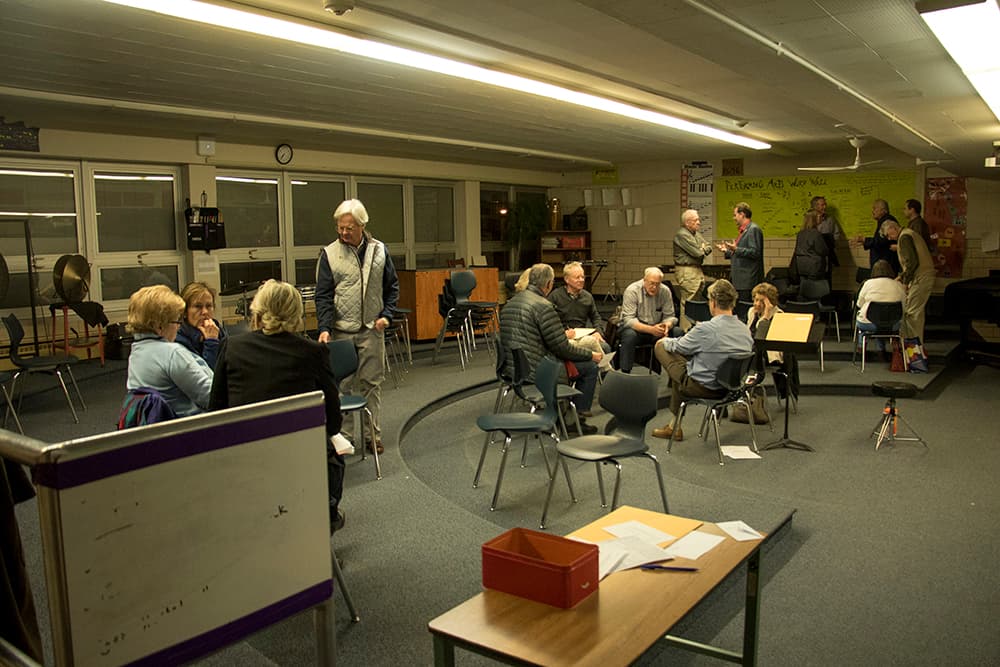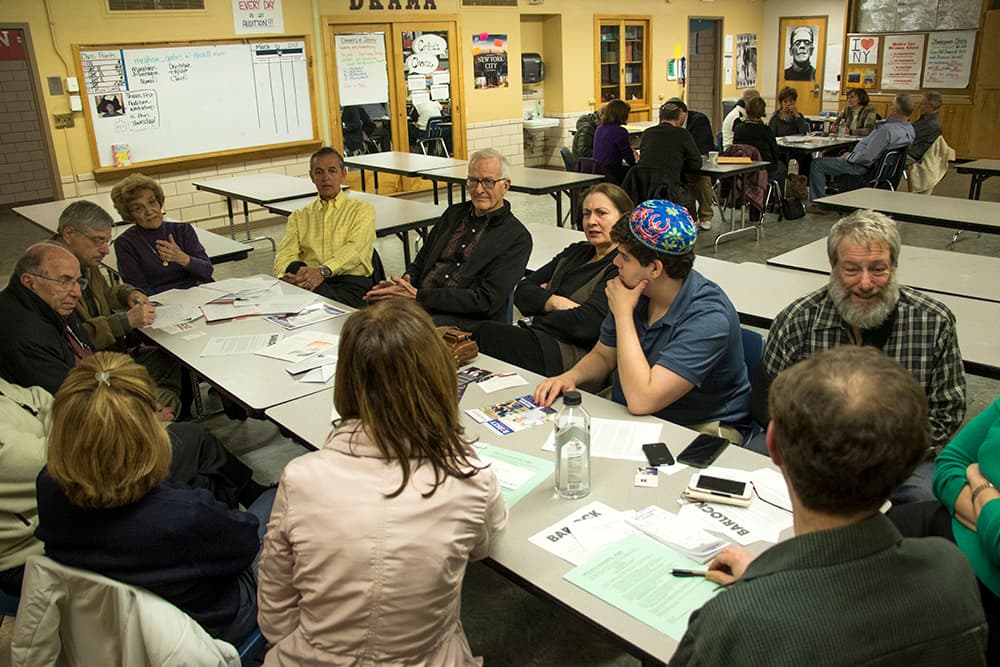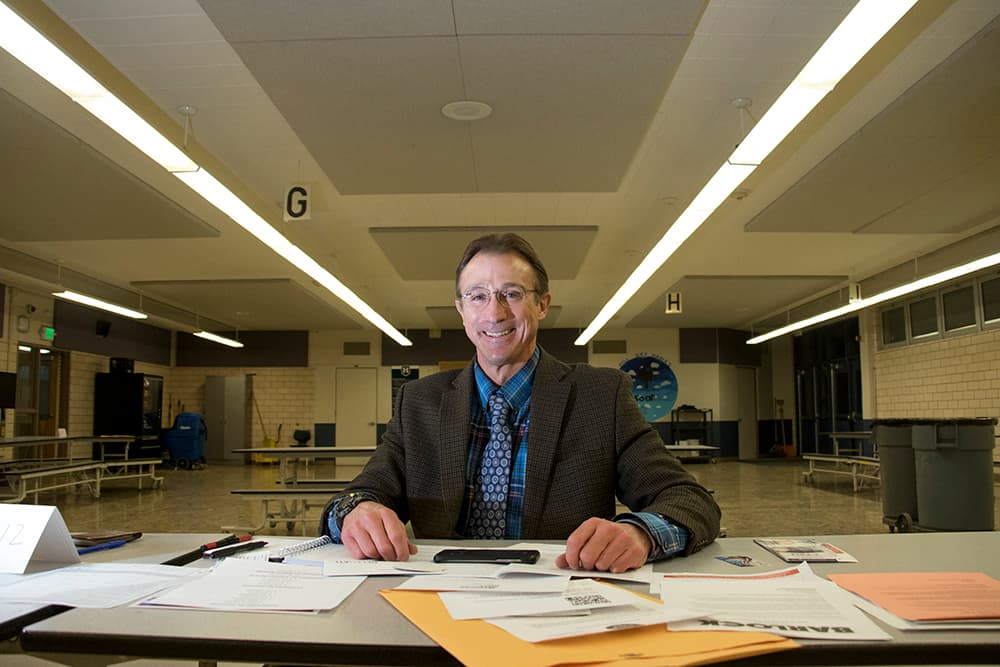
Near the entrance at Hill Campus of Arts and Science on Tuesday, a large white map displaying State House District 6, split into mostly rectangular precincts, was attached to a glass case.
As people walked in and passed the map, most were welcomed by Denver Republican Party Chairman Jake Viano. Many arrived at his table with puzzled faces -- they were there to participate in the caucuses for more than 20 Denver precincts, but didn't know where to go next.
For some particularly engaged Denverites, this is how the democratic process starts.
Residents gathered in several rooms and a cafeteria at the school, meeting only with their precinct. It’s here that those in attendance chose delegates to represent them in larger groups, leading up to the state assembly.

“So what does this all mean from a 30,000-foot perspective? This is the step before primary elections,” Viano said. “This is where we decide the people who get to decide who gets on the primary ballot.”
It’s the most grassroots way for candidates to get a shot at being listed on their party’s primary ballot. And while Tuesday was just the start, the day has long-term consequences. Republicans are hoping this year they will do something that’s only been done once in the past 43 years: Elect a Republican governor.
Tuesday’s caucus -- at least the one at District 6 -- ended with little clarification over which Republican candidate is favored. Viano said Tuesday’s turnout at their caucus site was low, and not what the party had hoped for, even in a year without a presidential election.
Residents like Neil Connolly and Mark Chilson, a first-time caucus participant, said they attended to get a better picture of who’s running and help them make a decision over who to vote for in June.

“I’ve been able to talk to people,” Chilson said. “It’s been a lot more informative than I would have expected.”
Chilson was the only person to show up in his precinct. He sat alone in a cafeteria table, dissecting a manila envelope each precinct received containing a script for the caucus process, campaign literature and forms for party donations, among other paperwork. He said he benefited most from coming early and speaking to people in the lobby before they split up to join their precincts.
“Sometimes there’s a full table and sometimes there will be a dearth of delegates,” Chilson said. “It’s all part of the experience and still enjoyable.”
For Connolly, caucuses present a chance to formulate opinions on candidates and discuss issues. He has been attending caucuses since 2010. He’s currently undecided about whom he would vote for in the governor’s race, like a majority of registered voters. He said he wants to elect a governor who will follow TABOR and has been displeased with what he said were liberal-leaning laws passed in Denver.
“I think Colorado politicians are different than most,” Connolly said. “I don’t think we need a hard-right or hard-left turn.”
Connolly said he wasn’t interested in being a delegate. That’s what caucuses are primarily for; they choose delegates who move forward to county or district assemblies, who in turn move toward the party’s statewide assemblies.
Caucuses are more important to some candidates than others. Not every candidates is participating in the caucus process, meaning they’re not necessarily encouraging their supporters to attend these meeting to express support for them. Republican candidate and Colorado Attorney General Cynthia Coffman, for example, is hoping to secure a spot on the primary ballot through the caucus process. The party's current frontrunner, Colorado Treasurer Walker Stapleton, is not.

Stephen Barlock is another Republican seeking a spot in the primary through the caucus process. He spoke at Hill on Tuesday, urging people to support his candidacy. The meeting place where his precinct convened -- the band room -- was familiar territory for him. He used to spend time there as a student at the school.
“Any event like this, where I can actually vote, use my civic right to help myself out, it works, it works really great,” Barlock said.
Barlock will need 30 percent of delegates at the state assembly to appear on the primary ballot. With several other candidates taking the same route, there's little room for error. A staunch supporter of President Trump, Barlock served as co-chair the president’s Denver campaign.
“I came over to the Republican party because of him," Barlock said. "I was an alternative delegate to the national convention because of him. I ran his office because of him, because I believed in him, because I believe that by giving American citizens a better opportunity to earn more money, to get out of this stagnant wages that we've been in... I'm not a millionaire, I'm just a regular Joe who's trying to make a living."












